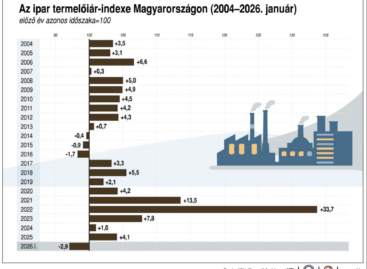GKI: Hungary has been in the EU for 20 years: how has the population’s trust in the European Union changed?
On May 1, 2004, ten new states joined the European Union, including Hungary. In our series of articles, we use one indicator to explore how the situation of our country has changed during our 20-year EU membership. The topic of this article is trust in the European Union.
In Hungary, after joining the EU, the public’s trust in the European Union improved (at that time, nearly two-thirds of the respondents trusted it). However, as a result of the 2008 crisis, this confidence was shaken: in 2008, the confidence index fell below 50%, followed by a short period of growth until 2010. By 2012, the indicator had fallen to an all-time low of 38%. This coincided with the peak of the Eurozone crisis this year (due to the situation in Greece and Italy), in addition, the situation of active earners significantly worsened due to changes in the SZJA (the real value of net earnings decreased by 3.5%), and that of pensioners didn’t grow either. The slogan “there is life outside the EU” found understanding ears among a part of the Hungarian population.
The subsequent rise was put an end to the refugee crisis in 2015: at that time, the indicator fell by 15 percentage points in half a year. However, the negative impact of the refugee crisis on trust turned out to be less lasting than that of the financial crisis: in the years following 2015, the trust index slowly returned to the pre-crisis value – not incidentally, the inflow of EU funds also peaked in these years.
A significant improvement was caused by the coronavirus epidemic, at the peak of the pandemic, 60% of the population saw the benefits of EU membership (e.g. the joint purchase of a vaccine against the corona virus). On the other hand, the energy crisis that peaked in the second half of 2022 – and the relaunched anti-EU campaign – had a negative effect on Hungarians’ attitude towards the EU: the trust rate fell below 50% again.
Related news
Related news
Festival buzz at the 60th anniversary EuroShop trade fair
🎧 Hallgasd a cikket: Lejátszás Szünet Folytatás Leállítás Nyelv: Auto…
Read more >Historic price reduction at ALDI
🎧 Hallgasd a cikket: Lejátszás Szünet Folytatás Leállítás Nyelv: Auto…
Read more >








